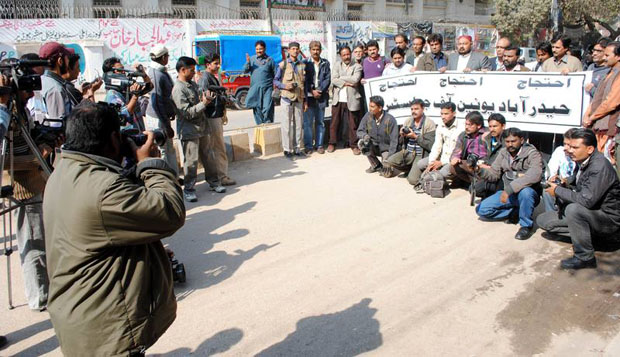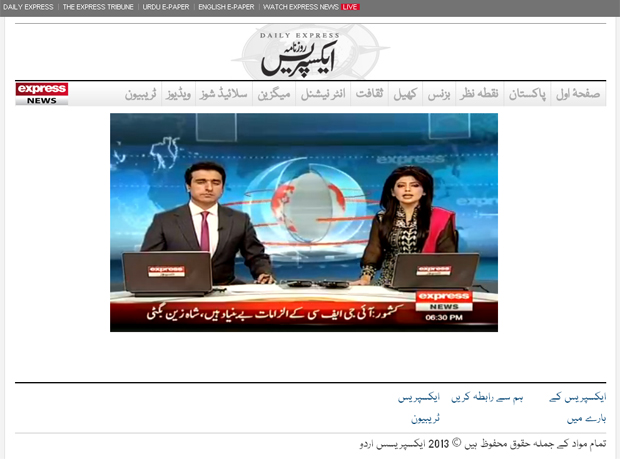23 Jan 2014 | News and features, Pakistan

Journalists in Hyderabad staged a protest after the killing of three media workers in Karachi (Image: Rajput Yasir/Demotix)
The Taliban crossed a red-line last week, when they killed three media workers in Karachi. An incensed Pakistani media blamed the prevalent culture of impunity for the violence against the press, and have urged the state to appoint special public prosecutors to investigate murders of journalists. But why should journalists be demanding this privilege?
Umar Cheema, special correspondent with The News, whose writings have landed him in trouble several times already, has a ready answer: “We are in the frontline on behalf of the citizens; we are paying with our lives.”
And Cheema, who in 2011 was awarded the Committee to Protect Journalists’ International Press Freedom Award for his courageous reporting, is not exaggerating. More than 50 journalists have been killed in the line of duty in Pakistan in the last ten years. According to the Pakistan Press Foundation (PPF), 40 were murdered because of their work.
The demand for a special public prosecutor has resonated with many journalists, including Mazhar Abbas, former secretary general of the Pakistan Federal Union of Journalists. “If the government appoints special public prosecutors at the provincial as well as at the federal level, it will help speed up both the trials and convictions,” said Abbas. At present no more than four or five cases out of the scores of journalists killed, have made it to court, he said.
There are several reasons for that, he explained: “Our courts are a big deterrent as it takes forever to seek justice. At times, the family of the deceased journalist is reluctant to pursue the case, sometimes the police discourages the family; and even the media organisation the journalist belongs to is not interested in taking it up.”
Journalists are also looking to media organisations to come up with a set of safety protocols. “The only weapons we can fight with are pens and mikes provided we know how to use them,” said Abbas.
And, added Cheema, regular demonstrations by journalists do not seem effective anymore. “Our protests should lead to some action, we have to become part of the solution.” To his mind, the journalist organisations should stop dithering and hold a dialogue with media owners to make certain demands on their behalf.
Abbas said reviving the joint action committee, comprising of journalists and media organisations who can “find ways of dealing with violence against media” would be a big first step.
Giving examples, he said: “The last strike against violence was observed by such a committee in 1989, when three journalists in Sindh were killed in one day. The second strong protest from a committee was witnessed in 1995, when the then Pakistan People’s Party government banned six evening newspapers in Karachi. The ban was lifted within a few days!”
But requests for media owners to commit to something where resources may be needed, will probably fall on deaf ears, says Ashraf Khan, a Karachi-based senior journalist: “We all know that while precious equipment at electronic media houses is insured as a top priority, the human machinery is not considered worthy enough to be insured!”
Cheema also cites lack of professionalism as something that may land many journalists into trouble. Hasan Abdullah, a journalist researching Islamist groups and who frequents both Federally Administered Tribal Areas and Afghanistan pointed out there were no “guarantees to life in a war zone”.
To keep from getting caught in the Taliban’s crosshairs, Abdullah said journalists “should be very careful with their language”.
“They should avoid using politically-loaded terms that would give their position away. It is best to stick with language that does not carry positive or negative connotations.”
Further, he said: “Every sane human carries an ideology or a set of ideologies, but when reporting, one must be seen to be impartial. Journalists should ensure that no matter how much they disagree with or loathe a view, they must give everyone the right to express their version. For TV journalists, it may be a good idea if their body language and tone is not too expressive of their internal feelings,” he cautioned.
This article was published on 23 January 2014 at indexoncensorship.org
22 Jan 2014 | News and features, Pakistan, Politics and Society

Pakistan’s Express News has been target of attacks by the TTP, including one which claimed the lives of three media workers.
Condemning the cold blooded assassination of three media workers belonging to a private television channel, the Pakistani media has united against the culture of impunity that has gripped the country.
The audacious attack happened on 17 January in Karachi, when a group of men on motorbikes, fired a volley at close range inside Express News’ van stationed in North Nazimabad. The sole survivor was a cameraman. Soon after, the Tehreek-i-Taliban Pakistan (TTP) contacted the television station and claimed responsibility for the attack.
TTP spokesperson, Ehsanullah Ehsan, said: “To kill certain people is not our aim”. The group said it targeted the media workers because they were “part of the propaganda against us”.
Analyst and director of media development at Civic Action Resources, Adnan Rehmat, believed the attack was “meant to browbeat and cow down a media that is becoming more outspoken and starting to criticize the Taliban”.
“It’s clearly a message to the whole of Pakistan’s independent media — to intimidate it and make it toe the militants’ line,” agreed Omar R. Quraishi, editor of the editorial pages of the English language Express Tribune, which is Express News’ sister organisation.
“What needs to be understood by all journalists and media groups in Pakistan is that an attack on Express Media Group is an attack on the whole media,” he pointed out.
“Express maybe in the firing line at the moment, but this is nothing short of an attempt to intimidate the media itself, and it will work,” journalist Zarrar Khuhro, of English daily, Dawn newspaper, formerly of ET, also conceded.
“This is because the state itself is so supine in the face of terrorists,” he said and added: “How can we expect one media group, or journalists as a whole, to take a stand when those who are supposed to protect the citizens of this country are bent upon negotiating with killers?” He was referring to the ruling Pakistan Muslim League’s insistence give peace a chance by holding dialogue with the Taliban.
Khuhro was, however, not entirely sure why ET was being singled out by the Taliban. ” Previously there have been rather insane social media campaigns against Express and it has been accused by the lunatic fringe of running anti-Pakistan and anti-Islam campaigns,” he told Index.
Ehsan said the Express TV had been attacked because the Taliban group considered its coverage “biased” and that it would continue to attack journalists they disagreed with. “Channels should give coverage to our ideology; otherwise we will continue attacking the media,” Express TV quoted him as saying.
This was the third such attack on the Express Media Group — which includes the Express Tribune and the Urdu-language daily Roznama Express, in addition to the television channel — in the last six months. In August and then again in December, unidentified gunmen shot at their newspaper office, in Karachi. Taliban claimed responsibility for the December incident.
But what is frustrating is that not one perpetrator has ever been caught. “This is a spectacular failure of the state and of the media sector’s ability to defend itself,” said Rehmat.
“If those involved in previous attacks had been caught, perhaps they would not have been emboldened to continue this campaign against the media,” said media analyst Owais Aslam Ali, secretary general of the Pakistan Press Foundation.
Rehmat finds a “fairly consistent pattern” in “these string of attacks” with over 100 journalists and media workers killed since 2000.
The Committee to Protect Journalists (CPJ) found soaring impunity rates in Somalia, Pakistan, and Brazil in 2013. The CPJ publishes an annual Impunity Index, which calculates unsolved journalist murders as a percentage of each country’s population. “Pakistan’s failure to prosecute a single suspect in the 23 journalist murders over the past decade has pushed it up two spots on the index. A new onslaught of violence came in 2012, with five murders,” stated the report.
But these attacks have put the Pakistani media in an ethical conundrum: How much airtime to give to the Taliban to keep them appeased?
“Media is now confronted by a double whammy challenge — wail about terrorism while simultaneously giving air time to those who perpetrate this violence,” said Fahd Hussain, news director at Express News.
“There is no easy answer and no formulaic editorial decision making process. What makes it even harder for the media to take a clear stance is the deep fissure within the media industry itself,” he told Index.
But experts say while training of journalists towards safety can help mitigate the problem to some extent, the government must act proactively as well.
“What is needed is for the government to appoint a special full-time prosecutor dedicated to investigating attacks against the media and for the media houses to adopt and implement best practices in safety protocols,” said Rehmat.
This article was published on 22 January 2014 at indexoncensorship.org


